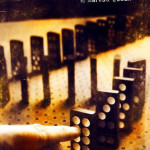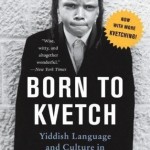Title: Percy Jackson and the Olympians
Author: Rick Riordan
Genre: Young Adult Fiction
Publication Date: One per year, 2005-2009
Purchase Price: $5.00-$11.00, depending on which book you’re purchasing
Misc. Info.: A series in five parts
Movies can be treacherous: they often get me interested in books I probably would never have thought about reading.
I found a copy of Percy Jackson and the Lightning Thief (book one in the series) at a small bookstore in a small town several years ago. The summary was interesting, but the cover art seemed a bit juvenile for my taste–so the book was set back on the shelf.
Fortunately, Fate gave me another chance to get into the series. When the film adaptation “The Lightning Thief” came out in early 2010, I managed to get interested. And because when I get into a book I really get into it, here I am doing a review of the entire series.
[A note to readers: I have made some attempts to avoid spoilers, but there are still some mild ones, as well as extensive quotations from all of the novels. If you would be upset by mild spoilers/plot explanations, please do not read further. Any comments to this entry will likely contain spoilers as well. Proceed with caution.]
The Books
The Lightning Thief — We are introduced to Percy Jackson, a dyslexic twelve-year old who is about to get kicked out of yet another boarding school. And it’s not really his fault–weird things just…keep happening around him. Little does he know that something big has gone down in Olympus: Zeus’ master lightning bolt has been stolen…and Percy is the prime suspect. Percy learns of his true heritage, and whispers of a great prophecy stir in the air…
The Sea of Monsters — Despite an enlightening and life-threatening summer, Percy’s seventh-grade year seems to be going pretty well. But when a simple game of dodgeball takes on demonic proportions, Percy must make a run for it. Then his friend Annabeth (daughter of Athena) appears with the disastrous news that Camp Half-Blood–where the children of gods have lived and trained for centuries–has been poisoned. It is up to Percy, Annabeth, and Grover the Satyr to retrieve the one thing can save the camp: The Golden Fleece. But what evil guards it?
The Titan’s Curse — Percy receives a distress call from his friend Grover: two new half-blood siblings have been found and are in danger. The quest to save the children takes a dangerous turn when Percy begins to have dreams. The ancient Titan Kronos was murdered and cut into one thousand pieces long ago by his children, Zeus, Poseidon, and Hades. But the old god is slowly reforming, and is planning his return to Olympus. Meanwhile, the great prophecy foretells of a half-blood who holds the power to save or destroy the gods…
The Battle of the Labyrinth — The citizens of Camp Half-Blood prepare for war as the Titan lord Kronos amasses more forces. When the camp’s magical borders are invaded from the inside, it is up to Percy, Annabeth, Grover, and several new friends to enter the Labyrinth. It is their mission to find Daedalus, the creator of the Labyrinth, and convince him that helping Kronos and his army will have disastrous consequences. But will they be able to navigate the massive maze that spreads underground for thousands of miles?
The Last Olympian — The series comes to an epic crescendo in book five. The Titan Kronos, along with several other resurrected Titans, is marching on New York City, intending to capture Olympus by force. With the gods squabbling amongst themselves, it is up to Percy and the other half-bloods to save Olympus from itself. But which way will Percy bend the prophecy? Will be preserve Olympus, or raze it into oblivion?
Main Themes
Because this is YA Fiction we’re talking about, there are the usual suspects when it comes to themes: the importance of friendship, the difference between right and wrong, and using teamwork to reach a common goal. But I was surprised by themes like feuds, forgiveness, and redemption. Then of course there’s the total saturation of the novels by allusions to Greek mythology.
But the theme that stood out to me most is a theme that I’m not actually sure that Riordan intended to put in the novels–although instances of it occur so frequently that I’m sure it must be intentional.
Percy has a strained relationship with his biological father, Poseidon. Not only did he not know who his father was until his twelfth year, he also couldn’t understand why he (and his mother) had been abandoned. Didn’t Poseidon love him?
“There was a different light in his eyes, a fiery kind of pride. ‘You did well, Perseus. Do not misunderstand me. Whatever else you do, know that you are mine. You are a true son of the Sea God.” (Book 1, p. 346)
And even once Percy does meet his father, the god of the sea doesn’t seem to be very present. Other gods and goddesses would often be in contact with their half-blood children, but Percy always felt ignored.
” ‘Percy, the hardest part about being a god is that you must often act indirectly, especially when it comes to your own children. If we were to intervene every time our children had a problem…well, that would only create more problems and more resentment. But I believe if you give it some thought, you will see that Poseidon HAS been paying attention to you. He has answered your prayers.’ “ (Book 2, p. 258)
The harder things got, the more half-bloods who joined the Titan Kronos, the more who died in the fights…Percy began to lack faith in humanity. Why did the gods let these things happen? Didn’t they know that evil people were doing evil things “on behalf of” the gods?
” ‘Percy, lesser beings do many horrible things in the name of the gods. That does not mean we gods approve. The way our sons and daughters act in our names…well, it usually says much more about them than it does about us.’ “ (Book 4, p. 357)
Anyone else catching the strong religion undercurrent? People of all faiths struggle with their relationship with their chosen deity, wonder if He or She answers their prayers, wonders how He or She can let people do evil in His or Her name. I don’t know if Riordan intended this to be as big a theme as it feels, but it certainly resonates with me. If I ever meet him, I know which question I’ll ask.
Some Thoughts
This series is a perfect example of a storyteller using stories to teach lessons about history, friendship, right and wrong, and even about religion. Many students are not exposed to a great amount of Greek mythology and stories until high school, and even then it is only generally taught for one semester/six weeks session. The moral or purpose of the original tales is not always easily caught, and Riordan does an excellent job of weaving his story with the ancient tales of the Greeks. There are lots of allusions to certain gods’ appearance, behavior, and history that are easily missed if you don’t know the original stories; but rather than being daunted, I think readers are instead challenged to do their own research and make their own connections.
Riordan also manages to sneak in some social commentary. We discussed the father/son relationship between Poseidon and Percy a moment ago, but another moment in the series struck me as particularly timely.
In The Battle of the Labyrinth, Annabeth is forced to go before the Sphinx. But rather than asking riddles (getting Annabeth to think critically and carefully) the Sphinx begins to ask for dry facts and attempts to get the girl to bubble in her answers in a test booklet. Annabeth refuses, and things go downhill fast.
” ‘This test material is specifically designed–‘
‘It’s just a bunch of dumb, random facts. …Riddles are supposed to make you think.’
‘…How am I supposed to test whether you can think? That’s ridiculous! Now, how much force is required–‘ “
Annabeth refuses to participate, and the Sphinx responds that if the girl won’t pass, she will fail. And since she can’t be held back, she’ll have to be eaten. A fight ensues, and the Sphinx’s electronic grading machine is destroyed. It’s an excellent commentary on the state of public education, as well as on the tough situation in which many teachers find themselves:
” ‘My grading machine!’ [the Sphinx] cried. ‘I can’t be exemplary without my test scores!’ “
As for the movie adaption, I was not totally opposed to the liberties taken. It was wrapped up very prettily, with no hint of the larger overarching plotlines that occur in the novels (this is likely because no one knew/knows if a sequel would be approved for filming). I was surprised, however, at the age difference: Riordan’s series begins with a twelve year-old Percy, but the film “The Lightning Thief” cast high school-age actors and actresses. Perhaps this was an effort to make the film more appealing to a larger audience, but I think it was an unnecessary change.
Percy Jackson and the Olympians is a fantastic series, one that I would recommend to anyone from twelve to immortal. Any series that contains humor, intelligence, allusions to literature and history and mythology, a bit of a love story, and just enough gore to be exciting is definitely a series that I can get into.
Other Works
Rick Riordan is a rather prolific writer who actually got his start writing mystery novels for adults. These stories are set in San Antonio, Texas, and revolve around Tres Navarre, a private eye/martial arts master/holder of a medieval literature Ph.D. I’ve not read any of the series, but they seem to contain the same intelligence of his explosively popular Olympians series.
Despite his apparent love and talent for mystery writing, Riordan cannot seem to get past ancient history; The Red Pyramid, first in a series about the Egyptian pantheon, was released earlier this year, and is garnering lots of great reviews.
And according to Riordan’s blog, an Olympian spin-off series is in the works. You can learn more about the various series by clicking on their respective icons on the right side of the blog.
Now if you’ll excuse me, I’m going to run out and buy The Red Pyramid.
Kick-ass Quotes:
“When you think ‘monster island,’ you think craggy rocks and bones scattered on the beach like the island of the Sirens. The Cyclops’s island was nothing like that. I mean, okay, it had a rope bridge across a chasm, which was not a good sign. You might as well put up a billboard that said, SOMETHING EVIL LIVES HERE.” (Book 2, p. 202)
” ‘Families are messy. Immortal families are eternally messy.’ ” (Book 2, p. 258)
” ‘There!’ Apollo pointed. ‘Long Island, dead ahead. Let’s slow down, dear. “Dead” is only an expression.’ ” (Book 3, p. 54)
” ‘You see, in times of trouble, even gods can lose faith. They start putting their trust in the wrong things, petty things. They stop looking at the big picture and start being selfish. But I’m the goddess of marriage, you see. I’m used to perseverance. You have to rise above the squabbling and chaos, and keep believing. You have to always keep your goals in mind.’ ” (Book 4, p. 105)
” ‘When Athena falls in love with a mortal man, it’s purely intellectual, the way she loved Odysseus in the old stories. It’s a meeting of minds. She would tell you that it’s the purest kind of love.’ ” (Book 4, p. 196)
If you could be any Greek/Roman god or goddess, who would you be and why? Think you’ll read this or any of Riordan’s series?






